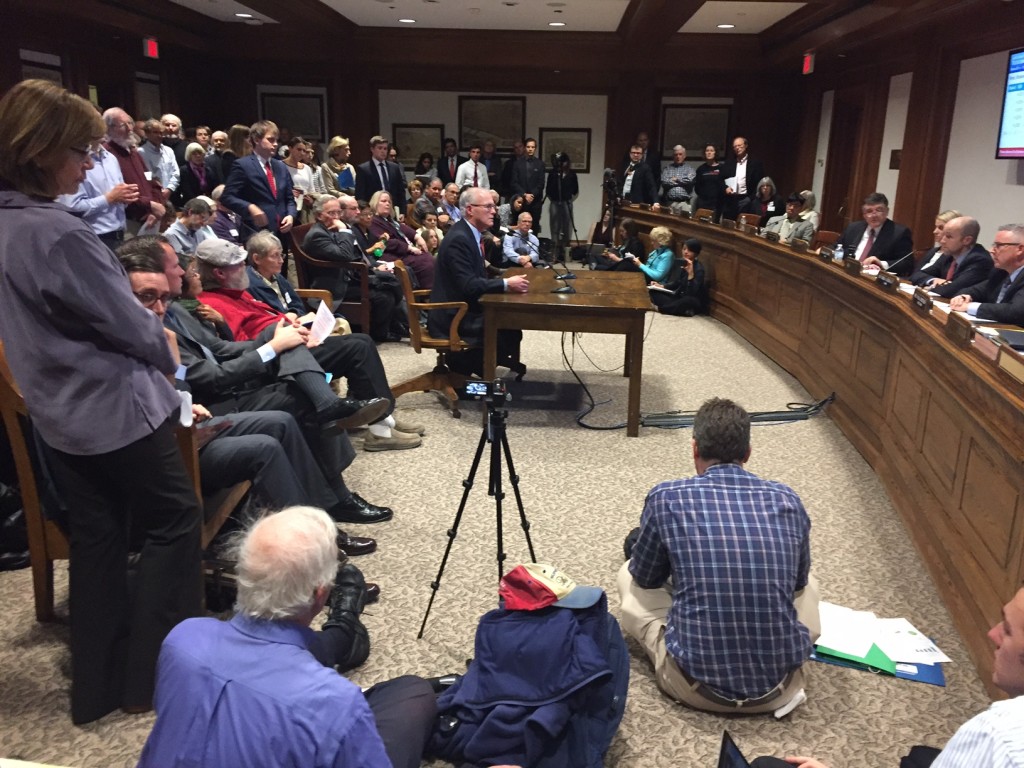Press Release
Boston – Inside a packed State House hearing room, businesspeople, economists, faith leaders, civic groups and concerned citizens pushed for a ground-breaking proposal to tackle global warming. The standing-room only crowd urged the legislative committee to approve S.1747, An Act combating climate change, filed by State Senator Mike Barrett, D-Lexington. The bill places a charge on dirty fuel emissions that contribute to global warming and then returns the money — in direct rebates — to residents, businesses and non-profits.
“We have to step up our fight against climate change,” Barrett told the Committee on Telecommunications, Utilities & Energy. He explained that the idea is “effectively a user fee on pollution.”
Tufts economist Frank Ackerman and MIT economist Chris Knittel voiced support for Barrett’s approach. They noted that their conservative and progressive colleagues agree that putting a price on carbon is the most effective way to fight global warming.
Local business leaders urged the committee to vote the bill out favorably. They included members of Environmental Entrepreneurs, Business Leaders for Climate Action, The Alliance for Business Leadership, Climate Action Business Association, The American Sustainable Business Council and the American Institute of Architects – MA Chapter.
“Carbon pricing is the smart business move,” said Jesse Mermell, Executive Director of ABL. “It grows the important clean energy sector of the Massachusetts economy, makes energy pricing more predictable and addresses climate change — a growing threat to corporate profits.”
“Businesses like the certainty, flexibility and sound economics of carbon pricing,” said Michael Green, Executive Director of CABA. “It’s not top-down government regulation.” Green added that business support is growing, noting that 100 business leaders have signed onto a letter endorsing the policy.
Civic and environmental groups agreed that putting a price on carbon is crucial. Members of Climate XChange, Clean Water Action, The Environmental League of Massachusetts, The League of Women Voters, 350MA, and the Massachusetts Climate Action Network came out in force.
“Massachusetts has a long history of leading the nation on critical issues, and this is another opportunity to show bipartisan leadership, this time on climate change,” said Marc Breslow, Co-Director of Climate XChange, an economist, and the lead author of the Commonwealth’s Clean Energy and Climate Plan for 2020. “We know from real-world experience in other places around the world, including British Columbia, that this policy can reduce emissions, strengthen the economy by keeping more of our dollars in the state, protect low and moderate income households, and help us meet our mandates under the Global Warming Solutions Act.”
“Right before our eyes, in our own time, we’re seeing extreme temperatures, rising oceans, wilder storms, and worsening droughts,” Barrett said. “A statewide carbon fee is the most ambitious step state government can take to combat the problem. This is like gay marriage, and like health care for all, in that Massachusetts can lead the way on an approach other states — and eventually the entire country — can adopt.”
S.1747 draws on the success story of British Columbia, the Canadian province whose right-of-center party instituted revenue-neutral carbon pricing in 2008. “Emissions are down, provincial GDP is up, and public opinion polls show high voter satisfaction. That’s a win-win-win,” Barrett said. Ann Berwick, who formerly headed the state Dept. of Public Utilities, said British Columbia’s economy has “prospered” compared to the rest of Canada since B.C. installed carbon pricing.
Carbon fees mean higher prices initially to incorporate downstream environmental and health costs. Higher prices motivate consumers to cut back when they can. Later, in an approach perfected by B.C., fee proceeds are sent back in equal shares to individuals and businesses. If a family conserves, it can collect more in rebates than it pays in fees. Because all money is returned, the bill does not put an unfair burden on the poor or on small business.
The bill would apply to transportation and heating and cooling fuels, but not electricity, since that sector is already covered under a cap-and-trade system. Supporters of carbon pricing say it’s critical to address the other sectors because they’re responsible for 80% of carbon emissions in the state.
In addition to lowering pollution, carbon fees in energy-importing states like Massachusetts mean less money goes to support jobs in fossil fuel-producing places like North Dakota, Oklahoma and the Middle East. But the decline in out-of-state expenditures keeps more money in Massachusetts, where it’s eventually spent, creating jobs here — 4,000 – 10,000 of them by 2030, according to a recent analysis. “The carbon fee-and-rebate approach is job-positive,” Barrett said.
Barrett’s bill has picked up 45 co-sponsors, more than 20% of the Massachusetts Legislature.
###
